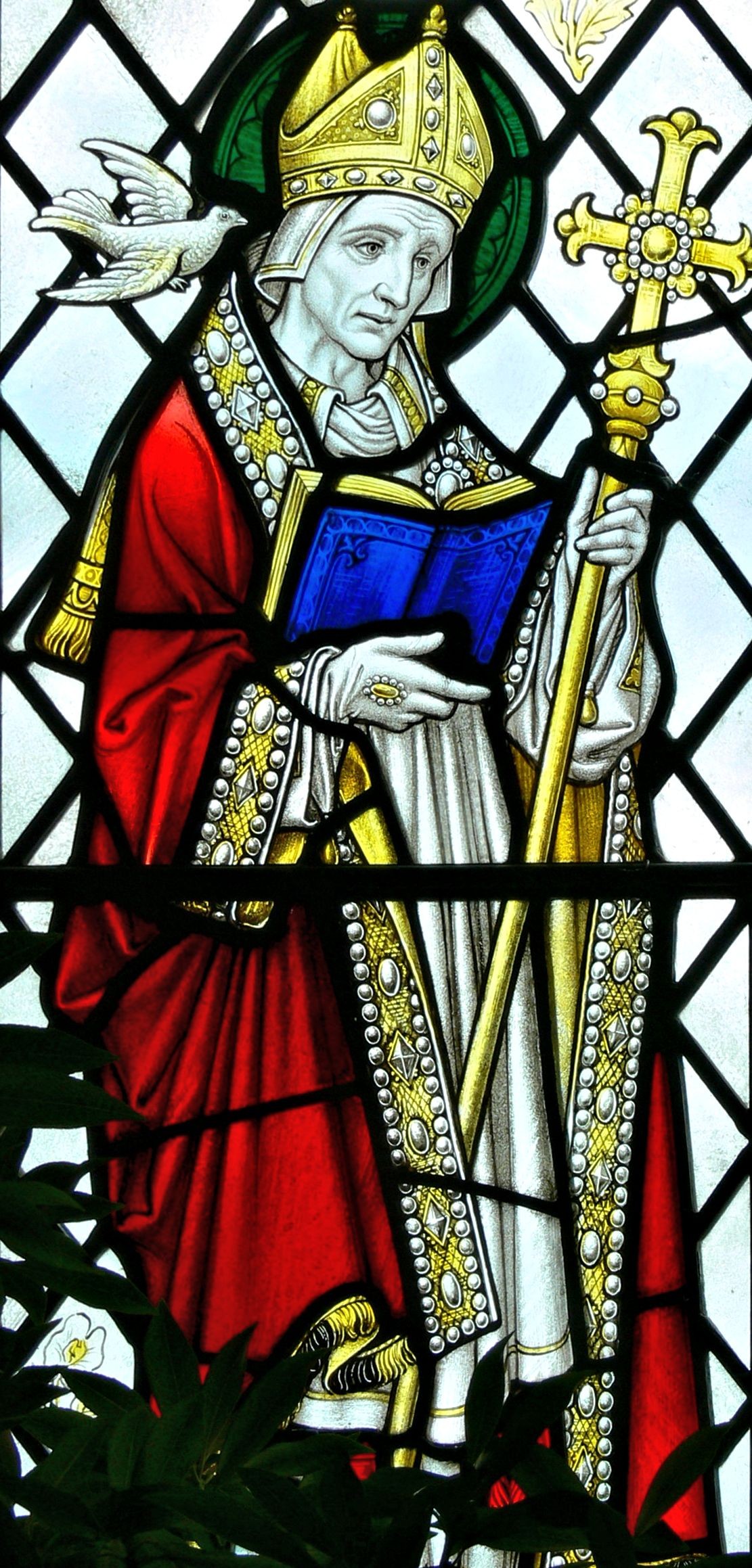by Elaine Breckenridge
Cover photo: St. Non’s Chapel, near St. David’s, Pembrokeshire, Wales
Happy St. David’s Day! St. David is commemorated on Roman Catholic and Anglican church calendars, and widely celebrated by the Welsh people. In Wales, he is also known as Dewi. As he is their patron, in many cities and towns in Wales, there are parades and special activities on his feast day of March 1.
Born in the sixth century, his mother was Saint Non. As a young boy, he was sent to the family of a bishop to be fostered and was dedicated to the church. Over time, David became both an abbot and a bishop. Some twelve monasteries were founded by St. David.
David is said to have been around six feet tall and very strong. He chose to live a simple life, dedicated to Christ, living mainly on water and vegetables. David and his monks became known as the “Watermen” since they only drank water and not the customary wine or mead in other monasteries. Despite his personal austerity, David was noted for treating others with respect and kindness. His words and his way of life encouraged many to join his religious community.
As David lay dying, he said these words to the people gathered, “Be happy, keep your faith and your belief, and do the little things that you have heard and seen me do.” As scholar Patrick Thomas points out in a discussion of David’s influence, “In any community apparently insignificant acts of habitual kindness and self-forgetfulness which display a fundamental respect and love for others can generate stability, unity and wholeness.” Earle and Maddox contend that Welsh spirituality was shaped not by ascetism but by a commitment to building community.
—Holy Companions Spiritual Practices from the Celtic Saints by Mary C. Earle and Sylvia Maddox
As I thought about what acts of habitual kindness and self-forgetfulness might look like; I remembered one special Lenten tradition we did in my family when I was growing up. It was called, “Secret Pals.” The five of us would draw lots until we each had a slip of paper that did not bear our name. That person would be our secret pal for the season. We were to do little gestures of kindness for our pal but in secret. For example, I remember getting up one morning and when I returned to my room from the bathroom, my bed had been made! On Easter Day it was fun to try to guess who our secret pal had been. And of course, each of us secretly doing little acts of kindness created more harmony in our household.
The life of David reminds us of the importance of living mindfully and helping others—whether it is in our families or communities or in the way we greet strangers. We may not have the means to change the world but we can all find ways to do good in our corner of it.
St. David lived in the sixth century. I think it is remarkable that he is still revered to this day. Certainly, the church has had some part in that. There are countless churches named St. David’s in Wales and in other countries too. However, it is also the poets and the artists and the people of Wales who have carried the memory of St. David forward into the present and no doubt will do so into the future.
In her book, The Celtic Way of Prayer, Esther De Waal writes about the imagination of Celtic Christians especially when it comes to remembering their favorite saints. Perhaps it is this quality of active imagination that makes the Celtic saints so real to so many. She writes that Celtic Saints are approachable, close at hand, woven quite naturally into life just the as would be any other member of an extended family. She references a poem written by the Welsh poet David James Jones (1899-1968) who is best known by his bardic or pen name Gwenallt. The poet, brings Dewi (St. David) right into his generation’s churches, schools, work places and homes.
“There is no barrier between two worlds in the Church.
The Church militant on earth
Is one with the Church triumphant in heaven,
And the saints are in this Church which is two in one.
They come to worship with us, our small congregation,
The saints our oldest ancestors
Who built Wales on the foundation
Of the Crib, the Cross and the Empty Tomb.
And they go out as before to travel their old ways
And to evangelize Wales.
I have seen Dewi going from shire to shire like the gypsy of God,
With the gospel and the altar in his caravan;
He came to us in the colleges and schools
To show us the purpose of learning.
He went down into the pit with the coal miners
And shone his lamp on the coal face.
He put on the goggles of the steel worker, and the short grey overall
And showed the Christian being purified like metal in the furnace.
He brought the factory people into his disreputable Church.
He carried the Church everywhere
Like a body with life and mind and will,
And he did small things and great.
He brought the Church into our homes,
Put the holy vessels on the kitchen table
With bread from the pantry and wine from the cellar,
And he stood behind the table like a tramp
So as not to hide from us the wonder of the sacrifice.
And after the Communion we had a talk round the fire
And he spoke to us of God’s natural order,
The person, the family, the nation and the society of nations
And the cross which prevents us from making any of them into a god.”
This poem has brought St. David into my life and made him real to me. I read this poem every March 1 and I give thanks for his life and witness and for the faithful people who continue to keep his ministry and mission alive carrying on the love of Christ. Like St. David, we too are invited to share in the ministry of doing little acts of caring wherever we are. Perhaps you will find a secret pal or place where you can do a little good in the name of Christ. May Gwenallt’s poem and the following prayer, inspire your season of Lent.
Lord, inspired by David and the Watermen,
help us to live in you as fish live in water,
help us to move in you as birds fly in the air,
help us to run to you as deer run through the forest,
help us to burn brightly for you as fire burns.
And may the fire of faith blaze afresh in us. Amen.
Ray Simpson, Daily Light from the Celtic Saints
 Preparing for the Garden Walk of Holy Week
Preparing for the Garden Walk of Holy Week
In the last few days of his life, Jesus moved from garden to garden from suffering to resurrection.
Join Christine Sine for a Lent retreat that reflects on this journey and prepares for the challenging week that follows Palm Sunday.

